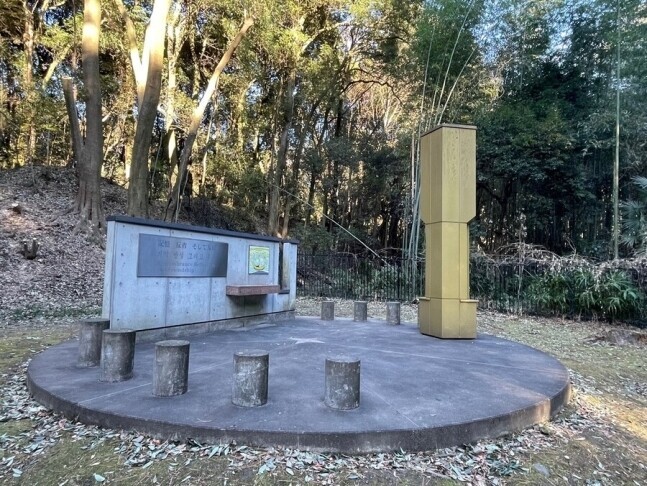hankyoreh
Links to other country sites 다른 나라 사이트 링크
German historian calls Japan’s removal of forced labor memorial ‘denial’ of historical responsibility

A German historian has launched an online signature campaign to stop Japan’s Gunma Prefecture from removing a memorial honoring Korean victims of forced labor mobilization during the occupation.
Reinhard Zöllner, a professor at the University of Bonn who studies Japanese history, initiated a signature campaign on the website Change.org on Saturday to oppose the removal of the memorial in an urban forest park under the administration of Gunma Prefecture. A total of 832 people had added their signatures as of Thursday noon.
Explaining his reasons for launching the campaign, Zöllner wrote, “Public remembrance cannot be decreed from above; it is a process in which all parts of society must be involved.”
“We therefore call on the prefecture to immediately enter into a public discourse with representatives of civil society [. . .] until a consensus is reached on the importance and necessity of remembrance and reconciliation,” he continued.
“The removal of this memorial without such a consensus will be seen by the world public as a denial of Japan's historical responsibility and a willful damage to Japanese-Korean relations,” he added.
“The still unfinished process of Japanese-Korean reconciliation will be severely damaged,” he warned.
Zöllner is recognized for his awareness of matters concerning South Korea-Japan relations, including the Japanese military “comfort women” issue.
In an interview published Wednesday in Japan’s Mainichi Shimbun newspaper, he said that he was “personally wounded” to see a video showing the park’s closure for the removal of a memorial carrying a peaceful message. He also warned that the actions would be damaging to Japan’s image.
Commenting on the hundreds of signatures that had been contributed in only a few days, he called this “important evidence of international awareness of this issue.”
On Monday, the Gunma prefectural government closed off the entrances to a prefectural park in the city of Takasaki to begin the process of removing a memorial raised in 2004 to honor Korean victims of forced mobilization. Currently, the front inscription on the memorial’s concrete wall — with its symbolic message of “Remembrance, Reflection and Friendship” — has been removed, along with a rear inscription expressing a message of “sincere reflection on the historic truth that Japan caused great harm and suffering to Koreans.”
The inscriptions were delivered to the civic group that raised the monument and has been maintaining it ever since. The association plans to discuss plans for their reuse, including the possible re-raising of the monument. The removal process is set to continue through Feb. 11.
The Japanese government has avoided expressing a position on the removal, which it has referred to as a “local government matter.”
Chief Cabinet Secretary Yoshimasa Hayashi, a spokesperson for the Japanese government, responded to repeated questions about the removal in regular press conferences on Monday and Tuesday by saying his “understanding is that this is a local government decision, with a finalized ruling by the Supreme Court of Japan.”
“The government will refrain from commenting,” he added.
By Kim So-youn, Tokyo correspondent
Please direct questions or comments to [english@hani.co.kr]

Editorial・opinion
![[Editorial] Intensifying US-China rivalry means Seoul must address uncertainty with Beijing sooner than later [Editorial] Intensifying US-China rivalry means Seoul must address uncertainty with Beijing sooner than later](https://flexible.img.hani.co.kr/flexible/normal/500/300/imgdb/original/2024/0517/8117159322045222.jpg) [Editorial] Intensifying US-China rivalry means Seoul must address uncertainty with Beijing sooner than later
[Editorial] Intensifying US-China rivalry means Seoul must address uncertainty with Beijing sooner than later![[Column] When ‘fairness’ means hate and violence [Column] When ‘fairness’ means hate and violence](https://flexible.img.hani.co.kr/flexible/normal/500/300/imgdb/original/2024/0516/7417158465908824.jpg) [Column] When ‘fairness’ means hate and violence
[Column] When ‘fairness’ means hate and violence- [Editorial] Yoon must stop abusing authority to shield himself from investigation
- [Column] US troop withdrawal from Korea could be the Acheson Line all over
- [Column] How to win back readers who’ve turned to YouTube for news
- [Column] Welcome to the president’s pity party
- [Editorial] Korea must respond firmly to Japan’s attempt to usurp Line
- [Editorial] Transfers of prosecutors investigating Korea’s first lady send chilling message
- [Column] Will Seoul’s ties with Moscow really recover on their own?
- [Column] Samsung’s ‘lost decade’ and Lee Jae-yong’s mismatched chopsticks
Most viewed articles
- 1For new generation of Chinese artists, discontent is disobedience
- 2[Editorial] Transfers of prosecutors investigating Korea’s first lady send chilling message
- 3[Exclusive] Unearthed memo suggests Gwangju Uprising missing may have been cremated
- 4[Editorial] Intensifying US-China rivalry means Seoul must address uncertainty with Beijing sooner t
- 5S. Korea “monitoring developments” after report of secret Chinese police station in Seoul
- 6N. Korean media upgrades epithet for leader’s daughter from “beloved” to “respected”
- 7Yoon says concern about biased diplomacy is being incited by “communist totalitarian forces”
- 8[Column] US troop withdrawal from Korea could be the Acheson Line all over
- 9Xi, Putin ‘oppose acts of military intimidation’ against N. Korea by US in joint statement
- 1060% of young Koreans see no need to have kids after marriage